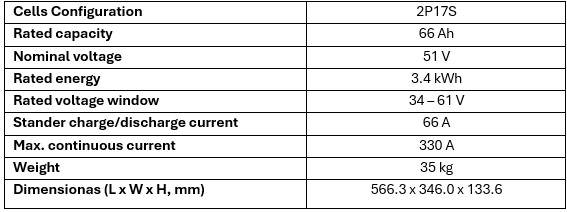
BePowered Module eMobility
BePowered Module eMobility
BePowered Module eMobillity is high-power battery modules for transportation, particularly for buses and heavy-duty vehicles, designed to meet the demanding requirements high power intensive vehicles.
66 Ah eMobility module
Key usage areas
Public Transportation
Urban and Intercity Buses:
High-power batteries enable electric buses to operate efficiently on urban routes with frequent stops and starts. They also support intercity travel by providing sufficient range and quick recharging capabilities.
Heavy-Duty Vehicles
Trucks: Electric trucks used for freight and logistics can leverage high-power batteries to carry heavy loads in urban areas. This is crucial for reducing the carbon footprint of the transportation sector.
Construction Equipment: Heavy machinery such as excavators and loaders can use high-power batteries to operate efficiently on construction sites, reducing reliance on diesel engines and lowering emissions.
Agricultural Vehicles: Tractors and other agricultural machinery benefit from high-power batteries by providing the necessary power for intensive farming operations while reducing fuel costs and emissions.
Quick Charging
Opportunity Charging:
High-power batteries support opportunity charging, which allows vehicles to recharge quickly during short stops (e.g., at bus stops or loading docks). This minimizes downtime and maximizes operational efficiency. For heavy-duty vehicles, megawatt charging systems enable extremely fast charging, reducing the time needed to recharge large battery packs.
Extended Range and Performance.
Durability and Reliability:
High-power batteries are designed to withstand the rigorous demands of heavy-duty applications, ensuring long service life and reliable performance even under extreme conditions.
Environmental
Reduced Emissions: By replacing diesel engines with electric powertrains, high-power batteries help reduce greenhouse gas emissions and improve air quality.
Economic Benefits
Lower Operating Costs: Electric vehicles generally have lower operating and maintenance costs compared to their diesel counterparts, providing long-term economic benefits for fleet operators.







